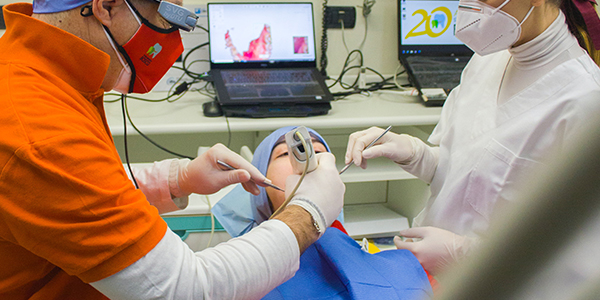ORAL, DENTAL and CHIN surgery
Oral, dental, and maxillofacial surgery is a specialist field in which patients with congenital or acquired diseases of the soft and hard tissues of the mouth, teeth, and jaw as well as diseases of the tissues around these areas are diagnosed and given the necessary surgical and medical treatments.
Treatments of Oral, Dental and Maxillofacial Surgery;
Extraction of impacted teeth,
Treating infections in the soft and hard tissues of the mouth, chin and face,
Diagnosis and treatment of fractures in the jaw area,
Biopsy and operations of cystic or tumoral formations in the soft and hard tissues of the mouth,
Implant applications and surgery,
Advanced bone augmentations,
Sinus elevation operations,
Root tip resection,
Botox applications
Surgical procedures applied before prosthesis,
can be listed as.
What is Oral, Dental and Maxillofacial Surgery?
Oral, Dental and Maxillofacial Surgery; It is the department that diagnoses and treats injuries, defects and diseases that occur in the mouth, teeth, face, jaw and soft and hard tissues of these regions.
This branch of surgery, which is a specialty obtained after a long and difficult education, is the branch of science that treats diseases, traumas and deformities that are aesthetically and functionally related to the head, face, mouth regions and special structures such as jaws and teeth.
Who is an Oral, Dental and Maxillofacial Surgeon?
Oral, Dental and Maxillofacial surgeons receive a doctoral specialization training which they work as a maxillofacial surgery assistant, the training lasts for 4 to 6 years after completing 5 years of dentistry education.
Those who receive this training are dentists who, after completing their master's degree in dentistry, branch out in their field and specialize in "Oral, Face, Maxillofacial Diseases and Surgery".
Oral, Dental and Maxillofacial Surgery Applications
As we mentioned in the first part of our article, Oral, Dental and Maxillofacial Surgery includes many important treatments. Let us briefly talk about some diseases and treatment methods that are practiced under this department and are very common in society.
Wisdom Teeth Surgery
When it comes to Oral, Dental and Maxillofacial Surgery, the first thing that comes to mind is the teeth that all people have either small or big problems. In fact, since it is widely talked about, quite wrong information is transmitted by people.
The wisdom teeth are the third molars located at the back of the people’s teeth. These teeth are often partially erupted or remain embedded in the jawbone due to reasons such as lack of space in the jaw, deviation in the eruption position or bone density in the relevant area.
Thanks to the new techniques and materials used in wisdom teeth surgery today, thepain that comes along the wisdom teeth can be easily treated. For people who have this problem, wisdom tooth extractions are no longer a scary nightmare. Especially for our Oral, Dental and Maxillofacial Surgeons who are experts in this field, wisdom tooth surgery is a very simple and easily applicable operation.
Impacted Tooth Treatment
Impacted Teeth usually do not give any symptoms and therefore only a small number of patients seek the treatment for these teeth after their checkup with the dentist. Impacted teeth are mostly detected through panoramic films taken when patients apply to the dentist for routine checkups, start orthodontic treatment or apply to the dentist with a different tooth complaint.
It is of great importance for dentists to inform the patient about the importance of early diagnosis of impacted teeth, which are present in the vast majority of patients, and the necessity of intervention to prevent possible damage. The most frequently impacted teeth are third molars, maxillary canines, mandibular premolars, and maxillary incisors.
Implant Treatment
Implants are artificial tooth roots placed in the jawbone in order to restore the function and aesthetics of teeth lost for various reasons.
Our teeth are physically an integral part of facial aesthetics and as a result of tooth loss experienced, it can cause discomfort in people in terms of psychological and social environment.
Apart from these factors, it is observed that nutrition, digestive problems and speech disorders occur in people with missing teeth.
Tooth deficiencies can be completed with conventional methods such as bridge prostheses attached to natural teeth or removable prostheses, as well as with implant which support the prostheses.
Our specialist dentists state that if the missing tooth treatment is to be applied for a single tooth, it will be way better in terms of protection to treat it with an implant rather than a bridge.
Cyst Operations
Cyst operations takes a very important part in Oral, Dental and Maxillofacial Surgery applications. Pathogenic structures that can develop in the roots of the teeth or in any part of the jawbone are called cysts.
If cyst operations are not performed on time and the cyst remains in the jaw for a long time, they may cause serious deformations in the jawbone. For this reason, detected cysts should be surgically removed by the maxillofacial surgeon as soon as possible.
Some cysts are very large and may cause the jaw to break. For this reason, our maxillofacial surgeons want to detect bone loss caused by the cyst by requesting volumetric tomography before the procedure.
Thanks to 3D tomography, the borders of the jaw cyst are determined very clearly and the surgery is done much more safely.

